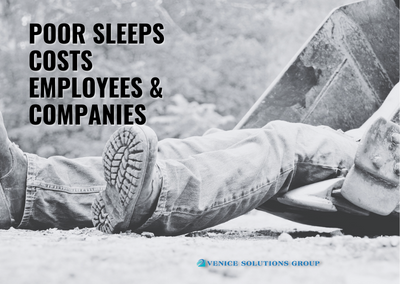It may be hard to admit, but your mom was probably right when she said, “Get a good night’s sleep, and you’ll feel better in the morning.” A recent Gallup poll asked about sleep habits and their impact on productivity, and there is no doubt that mom’s conventional wisdom is supported.
It’s not just employees who suffer when they don’t get enough sleep. According to Gallup researchers, insufficient sleep is linked to $44 billion in lost productivity for employers.
Fortunately, some steps can be taken to combat this growing workplace scourge.
The study found that employees reported 2.29 days of unplanned missed workdays in a month due to poor health versus .91 days for all other workers, in the study adjusted for other health-related absenteeism.1 Further, respondents who didn’t sleep well reported more job changes in the past 12 months, whether voluntarily or involuntarily. Based on the analysis, these job changes could result in 980,557 job changes and a replacement cost of $32.4 billion.
More research might change those numbers, but most agree fatigue contributes to illness and lower productivity. Does anyone you know make their best decisions when they are exhausted? Probably not.
Employers, especially Human Resources professionals, already operate in a highly competitive environment for talent. The additional turnover and absenteeism add to the stress of a stretched-thin workforce.
Sleep loss is the tip of the iceberg for productivity challenges for personal and family health problems. Even before the COVID-19 pandemic, the Centers for Disease Control estimated productivity losses at $1,685 per employee per year, which is $225.8 billion annually.2
Although there are no quick fixes, there are a few steps you can take to start combating poor sleep, including:
• Educating employees on tips for better sleep habits (e.g., sticking to a consistent sleep schedule, removing electronic devices, reducing caffeine)
• Informing employees of healthcare benefits that can provide options for a medical issue that may be the source of lack of sleep
• Allowing flexible schedules, when possible, to encourage natural sleep patterns (e.g., permitting “morning people” to come in early and providing “night owls” a little more time in the morning)
• Encouraging a healthy work-life balance to reduce stress
• Promoting and incentivizing exercise (e.g., reimbursing a gym membership, holding a drawing for anyone who participates in a fitness activity or giving a prize for the best weight improvement)
• Advocating for utilizing natural light, when possible, to improve one’s ability to fall asleep, which experts say is a simple step at home and in the workplace
• Avoiding drastic changes in shifts whenever possible as sleep patterns are disturbed if a person regularly switches between day shift and night shift
• Making rest and wellness part of your culture by encouraging leaders to regularly discuss the company’s priority of wellness, including getting enough sleep and keeping stress low
Intentional behaviors become habits over time. A company’s culture is formed by its habits. Workplaces that create an atmosphere of wellness and encourage employees to get enough sleep are desirable places to work. A well-rested workforce is safer, more productive and far less costly. Try some of these and spread the word to your colleagues. Simple solutions can sometimes solve the most challenging problems.
Tommie Jo Brode is the President of Venice Solutions Group, based in Hudson, Ohio. The firm was founded in 2021 with a commitment to good workplace communication, best employment practices, and promoting common sense solutions. Venice Solutions Group helps public, private, and non-profit organizations solve small problems before they become bigger ones and address big issues before they become more costly. Learn more at venicesolutionsgroup.com.

